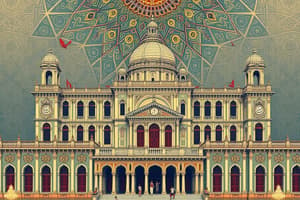Podcast
Questions and Answers
What are the two broad types of legislatures?
What are the two broad types of legislatures?
Unicameral and bicameral
Name a country with a unicameral legislature.
Name a country with a unicameral legislature.
Belize
What is the function of lawmaking in a legislature?
What is the function of lawmaking in a legislature?
Passing laws that outline rights and responsibilities, set government framework, and define institutions.
Explain the oversight function of a legislature.
Explain the oversight function of a legislature.
What do legislatures approve as part of their functions?
What do legislatures approve as part of their functions?
What factors can influence the structure of a legislature?
What factors can influence the structure of a legislature?
Describe the legislative process in a nutshell.
Describe the legislative process in a nutshell.
What is one major challenge faced by legislatures related to political parties?
What is one major challenge faced by legislatures related to political parties?
How does government gridlock negatively impact legislative effectiveness?
How does government gridlock negatively impact legislative effectiveness?
What impact can technological advancements have on legislatures?
What impact can technological advancements have on legislatures?
Flashcards are hidden until you start studying
Study Notes
Exploring Political Science: Legislatures and Their Functions
Legislatures play a central role in the functioning of a democratic government, serving as the primary forum where policies and laws are debated, shaped, and ultimately enacted. In this article, we'll unpack the key aspects of legislatures, including their types, structures, functions, and challenges.
Types of Legislatures
Legislatures can be categorized into two broad types: unicameral and bicameral.
- Unicameral legislatures have a single legislative chamber, as seen in countries like Belize and Israel.
- Bicameral legislatures consist of two chambers, such as the United States Senate and House of Representatives, and the UK's House of Commons and House of Lords.
Functions of a Legislature
Legislatures serve several crucial functions within a democratic system:
- Lawmaking: Legislatures pass laws that outline the rights and responsibilities of citizens, set the framework for government activities, and define the role of various institutions.
- Representation: Legislators represent their constituents' interests and concerns.
- Oversight: Legislatures hold the executive branch accountable for its actions and decisions through investigations and hearings.
- Approval: Legislatures approve budgets, appointments, and treaties.
Structure of a Legislature
Legislatures vary in their structure based on factors such as the size of the legislative body, the system of apportionment, and the electoral system.
- Size: The number of legislators can range from as few as 10 (in Belize) to over 500 (in India).
- Apportionment: The distribution of seats in a legislature can be based on population, political party, or other factors.
- Electoral system: Elections can be held using different systems, such as first-past-the-post, proportional representation, or a combination of both.
Legislative Process
The legislative process involves multiple steps and stakeholders:
- Legislation proposal: A legislator, committee, or the executive branch proposes a bill.
- Committee hearings: The bill is analyzed and discussed in committee.
- Markup: The committee drafts and amends the bill.
- Floor debate: The bill is debated on the legislative floor.
- Vote: The bill is voted on and can be passed, rejected, or sent back to committee.
- Conference committee: If the bill is passed by both chambers but with different versions, a conference committee establishes a compromise version, which is then voted on by both chambers.
- Enactment: The bill is signed into law by the executive branch or becomes law without their signature.
Challenges Faced by Legislatures
Legislatures face various challenges, including:
- Partisan polarization: The growing ideological divide between political parties can impede collaboration and compromise.
- Government gridlock: When the legislative and executive branches are controlled by different political parties, it can lead to gridlock and inaction.
- Public trust: The public's trust in legislatures has been declining due to factors such as corruption and the perception that legislators prioritize their own interests over those of their constituents.
- Limited resources: Legislatures often face resource constraints, which can affect their ability to fulfill their responsibilities effectively.
- Technological advancements: The rapid pace of technological change poses challenges for legislatures to keep up with new developments and to effectively regulate them.
In conclusion, legislatures play an essential role in the functioning of democratic societies. By understanding their types, structures, functions, and challenges, we can better appreciate the complex and important work that legislators and legislatures do to serve their constituents and uphold democratic principles.
Studying That Suits You
Use AI to generate personalized quizzes and flashcards to suit your learning preferences.




